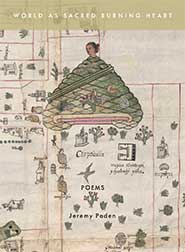Our Authors

Jeremy Paden
In World As Sacred Burning Heart, Jeremy Paden offers a collection of poems set in Colonial Latin America that weaves together three strands. There are prose poems about Captains like Columbus, Cortés, and Las Casas that play with the language and syntax of sixteenth-century chronicles. These poems use irony to interrogate the official story. The second strand is ekphrastic poems on maps, on quipus, on Aztec featherwork mosaics, and other cultural objects. The third strand is poems of resistance and poems of coming into knowledge.
To live in the American hemisphere is to live in a colonial state. These poems examine and interrogate that legacy. They respond to the self-aggrandizing myths the Western world tells itself about its own past. This collection argues that America (North and South) is a palimpsest, a layered story, born out of colonial occupation and resistance. Ultimately, these poems ask two urgent questions: can we live with “the madness/of finally knowing who we are?” and “how do we sing a song that remembers the world into wholeness?”
How do we “sing the song that remembers/the world into wholeness”? Jeremy Paden has done just that in this astonishing new collection of poems documenting the Spanish Colonial period. Inspired in part by the great mappamundi of the 15th and 16th centuries—cordiform and cloverleaf; the face of the jester as if to provoke the vanity of conquering princes—these knowing, expansive poems are in part a “song to ignorance and consequences,” of the captains: Cortés, Aguirre, de Vaca, and most of all Columbus, their dreams of sons and cinnamon-skinned lovers; their search for the islands of nutmeg and pepper; their doubts and retractions; how they will “love & eat & steal” from a lush and feathered paradise of scarlet and ochre, of green mountains and sweet cane; of gold, of gold, of gold. But too, they are the song of the encantado, the river dolphin with blind eyes, and of ayotl and cuauhtli at the beginning of the world, its story of brokenness made whole; of the nopal, the world tree, and of an Incan mermaid carved on a temple wall high above the river. They are the bloodsong of Moctezuma and the feathered serpent Quetzalcoatl. World As Sacred Burning Heart recovers that wholeness as heart that flares and pants with the desires of the conquered and the conquering, an ancient story urgent and still beating in our blood.
—Lynnell Edwards, This Great Green Valley
Jeremy Paden ignites the veil that disguises colonialism as heroism in his vital new collection World As Sacred Burning Heart. A feat of emotional and historical integrity, the poems offer portraits of seafaring captains and their exploits in inhabited worlds new to them. It’s the poet’s eye that serves as balance: a gaze determined to show the beauty that entitlement destroys. When one voyager acknowledges “the truth that we never travel/beyond ourselves, that we sail weighted/with a cargo of heartbreak, of fear,” Paden proves he has penned a wise and unforgettable journey.
—Mitchell L. H. Douglas, dying in the scarecrow’s arms
On a first reading of Jeremy Paden’s many-layered World As Sacred Burning Heart, you need not have a firm grasp of the particulars to be drawn into the Age of Discovery it investigates, the sixteenth century to be specific, but reader, beware: you may find yourself drawn back again and again, and in the interval trying to comprehend where it is you stand, literally, while also seeing how maps shape and are shaped by a particular world view. While this is a book of dispraises—the gospel of love becoming a cover for rapaciousness; captains, mindful of duty and patronage, telling only the parts of the story that shore up the shared dream of a New Jerusalem—it also is a very human book, and that is the poetry in it. Anaphora pulses through the lineated poems as well as the captain poems, written in analogue form and in which, from bare-bone fragments, Paden fleshes out what is left out of the official letters. In the relationship between his office and the man who is captain, we see how to cling to the dream is to see reality as a nightmare, to project one’s desires and fears upon the world. Here are the roots of global trade and colonial empires as they unfold primarily in Latin America and the Caribbean. Here is a book to feel your way through where we have been, to know where we are.
—Debra Kang Dean, Totem: America
In World As Sacred Burning Heart, Jeremy Paden selects as his protagonist that shadow, Christopher Columbus. Columbus and all the other captains, the ones who took and took and still take. In so doing, Paden interrogates the official and unofficial histories of the Americas. Somehow, all the while, Paden unrolls the forgotten map that leads to the one treasure that can never, ever be stolen: the shared and shareable human heart.
—Rebecca Gayle Howell, American Purgatory
Born in Milan, Italy, Jeremy Paden was raised in Nicaragua, Costa Rica, and the Dominican Republic. He obtained a PhD in Colonial Latin American literature at Emory University and is a professor of Spanish at Transylvania University in Lexington, Kentucky. He also teaches literary translation at Spalding University’s Low-Residency MFA. He is the author of three chapbooks of poems, Broken Tulips, ruina montium, and prison recipes. Paden has translated contemporary Spanish and Latin American poetry. His Spanish language collection of poems, Autorretrato como una iguana/Self-Portrait as an Iguana, was named co-winner in the first Poeta en Nueva York Prize. World As Sacred Burning Heart is his first full-length collection in English.

